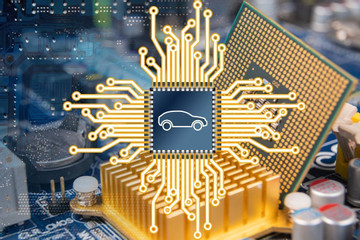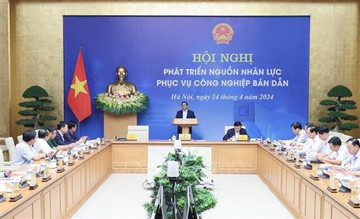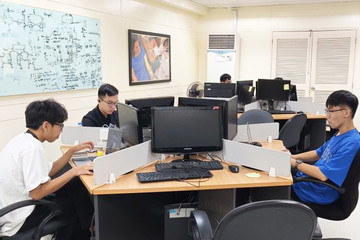- © Copyright of Vietnamnet Global.
- Tel: 024 3772 7988 Fax: (024) 37722734
- Email: [email protected]
vietnam's semiconductor industry
Update news vietnam's semiconductor industry
More than $1 billion needed to train 50,000 semiconductor engineers
The MPI has reported back to the Prime Minister on the project ’Developing human resources in the semiconductor industry to 2030, with a vision to 2050’.
Vietnamese should focus on making chips
FPT President Truong Gia Binh says that Vietnamese should focus on learning how to develop AI, make microchips, and manufacture automobiles, rather than doing agriculture and tailoring clothes.
Da Nang in future: free trade zone, tourism center and semiconductor hub
Da Nang's advantages could enable the establishment of a new free trade zone (FTZ) that would attract investors, a tourism center luring high-income earners, and a semiconductor hub with excellent human resources.
Da Nang aims to have 1,500 chip designers in six years
The Da Nang Information and Communications Department is drafting a plan on developing a semiconductor and AI industry, with focus on chip designing, assembly, testing, and packaging, according to the department’s deputy director Tran Ngoc Thach.
Semiconductors: an 'expensive game' for Vietnam
It is clear that Vietnam should develop a semiconductor industry, but we need to seriously consider which stage of the global value chain to participate in and how determined we are to gain a position in that value chain.
Vietnam-made chips to spur progress toward becoming a developed country
Rice has helped Vietnam escape from hunger and poverty. Make in Vietnam chips are expected to help Vietnam become a developed country, according to Nguyen Thanh Yen, administrator of the Vietnam Microchip Community.
US company Marvell sets up semiconductor design center in Da Nang
US company Marvell Technology, Inc., which offers infrastructure semiconductor solutions, has announced the opening of a new design centre in Da Nang City.
MIC promotes cooperation for AI, semiconductor development
Vietnam is penning a strategy to develop the semiconductor industry until 2030 with a vision to 2045, envisioning to become a centre for the semiconductor chip industry by 2030 with operation in design, packaging and testing.
Higher salaries will attract more semi-conductor engineers
Vietnam needs at least 50,000 engineers by 2030, ten times the current number, to have a place on the world semi-conductor map.
Manpower is key to building semiconductor industry in Vietnam
Minister of Information and Communications Nguyen Manh Hung says there should be a national agreement on workforce supply to ensure success for the human resources development project.
Semiconductor tech now as 'hot' as computer science major: educators
Semiconductor technology has been a popular training major in recent years, according to Pham Nguyen Hai from the Faculty of Physics under the Hanoi University of Natural Sciences.
Vietnam poised to bridge global semiconductor workforce gap
Vietnam has the potential to meet the global semiconductor workforce need in short, medium and long terms, Minister of Information and Communications Nguyen Manh Hung told a recent seminar.
Call to arms for semiconductor roles
Chip design is set to boom in Vietnam in the coming years, with many investors entering the market. However, human resource training needs more backing for the industry to achieve high quality and capture opportunities.
VN semiconductor industry awaits groundbreaking policy
The implementation of a project on developing human resources for the semiconductor industry requires a strategic vision and thorough understanding about the relationship between the electronics and semiconductor industries.
Personnel resource: Vital for VN to join semiconductor industry
Promptly developing high-quality human resources is vital for Vietnam to utilize its advantages and participate effectively in the multibillion-dollar chain of the semiconductor industry, said Deputy Prime Minister Tran Hong Ha.
Vietnam lacks chip-design engineers despite high salaries
The number of semiconductor engineers in Vietnam is low compared with demand, especially in chip designing.
VN vows to compete with global chip/semiconductor powerhouses
Vietnam will be a must-visit destination for chips and semiconductors by 2030, Hoang Nam Tien, Vice Chair of the Board of Trustees of FPT University, predicted.
Vietnam should focus on semiconductor chip design, experts say
Vietnam should gather strength on chip designing, because this has the highest value in the semiconductor industry chain, the head of IT Institute, Tran Xuan Tu, has said.
Semiconductor workforce development a breakthrough: PM
Human resources development in semiconductors should be considered a breakthrough in personnel training, Prime Minister Pham Minh Chinh said at a conference in Hanoi on April 24.
Vietnam has opportunities to supply workforce for semiconductor industry
The semiconductor industry is struggling with a serious shortage of workers, offering a great opportunity to Vietnam.



















